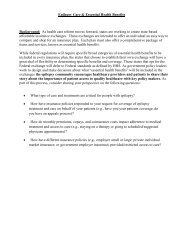Legal Rights of Children with Epilepsy in School & Child Care
Legal Rights of Children with Epilepsy in School & Child Care
Legal Rights of Children with Epilepsy in School & Child Care
You also want an ePaper? Increase the reach of your titles
YUMPU automatically turns print PDFs into web optimized ePapers that Google loves.
What are the <strong>Legal</strong> <strong>Rights</strong> <strong>of</strong> <strong><strong>Child</strong>ren</strong> <strong>with</strong> <strong>Epilepsy</strong> <strong>in</strong> the <strong>Child</strong> <strong>Care</strong> Sett<strong>in</strong>g?<br />
4) Particularly because Joyful <strong><strong>Child</strong>ren</strong> is part <strong>of</strong> a cha<strong>in</strong> <strong>of</strong> child care centers and,<br />
therefore, has more resources than a sole provider, it is quite likely that Ashley’s<br />
mother would be able to make a successful argument that Joyful <strong><strong>Child</strong>ren</strong> has<br />
discrim<strong>in</strong>ated aga<strong>in</strong>st Ashley if the center cont<strong>in</strong>ues to refuse to adm<strong>in</strong>ister<br />
emergency medication. She could file a compla<strong>in</strong>t under the ADA <strong>with</strong> the<br />
Department <strong>of</strong> Justice or pursue a claim <strong>in</strong> court.<br />
Case Scenario 3 — Private After-<strong>School</strong> <strong>Child</strong> <strong>Care</strong> Program on <strong>School</strong> Grounds<br />
Teddy is a six-year-old child <strong>with</strong> epilepsy and cerebral palsy. He is fully <strong>in</strong>cluded <strong>in</strong> a<br />
first-grade class <strong>in</strong> his local elementary school. His parents tried to enroll him <strong>in</strong> “Busy<br />
and Safe Kids” (BASK), an after-school child care program run by a small private agency<br />
on the grounds <strong>of</strong> his school. Teddy is mobile <strong>with</strong> a walker or crutches, but he is not<br />
toilet tra<strong>in</strong>ed. BASK has refused to accept him because <strong>of</strong> his toilet<strong>in</strong>g needs and because<br />
it has a “no medication” policy, and Teddy needs a dose <strong>of</strong> his antiepileptic medication<br />
after school. Teddy’s parents contact an attorney for legal assistance.<br />
Discussion and Possible Advocacy Strategy: As a private program, the BASK program<br />
is subject to Title III <strong>of</strong> the ADA and cannot reject Teddy simply because he needs<br />
medication after school. A reasonable accommodation <strong>of</strong> his epilepsy would be to modify<br />
the “no medication” policy or to make an exception for Teddy so that he can attend the<br />
program and receive his afternoon dose <strong>of</strong> medication. With regard to his toilet<strong>in</strong>g needs,<br />
whether chang<strong>in</strong>g his diapers is a reasonable accommodation will depend on whether the<br />
program provides diaper<strong>in</strong>g or toilet<strong>in</strong>g assistance to any other children <strong>in</strong> the program.<br />
For example, s<strong>in</strong>ce BASK is located at an elementary school, if the program is open to<br />
preschoolers who might be attend<strong>in</strong>g the school, it is possible that staff are provid<strong>in</strong>g<br />
diaper<strong>in</strong>g or toilet<strong>in</strong>g assistance to these younger children. If this is the case, then the<br />
program will need to provide such assistance to Teddy as a reasonable accommodation. If<br />
the program does not provide diaper<strong>in</strong>g or toilet<strong>in</strong>g assistance, then Teddy would still be<br />
entitled to the assistance as a reasonable accommodation if the assistance does not<br />
fundamentally alter the program. The follow<strong>in</strong>g strategy may be <strong>of</strong> assistance to Teddy’s<br />
parents and their attorney:<br />
1) Arrange a meet<strong>in</strong>g <strong>with</strong> the director <strong>of</strong> the BASK program to expla<strong>in</strong> what Teddy<br />
needs beyond the standard care provided to all children <strong>in</strong> the program. It is likely<br />
that <strong>in</strong> the three-hour period Teddy is <strong>in</strong> after school care each day, his extra<br />
needs would be limited to one adm<strong>in</strong>istration <strong>of</strong> oral medication and one diaper<br />
change. These needs should be easily accommodated.<br />
2) If the director cont<strong>in</strong>ues to be resistant, try to facilitate a meet<strong>in</strong>g or conversation<br />
between the BASK director and the school staff who work <strong>with</strong> Teddy dur<strong>in</strong>g the<br />
school day. <strong>School</strong> staff should be able to allay any concerns the BASK director<br />
has about adm<strong>in</strong>ister<strong>in</strong>g medication to Teddy or about the time <strong>in</strong>volved <strong>in</strong><br />
address<strong>in</strong>g his toilet<strong>in</strong>g needs.<br />
35








